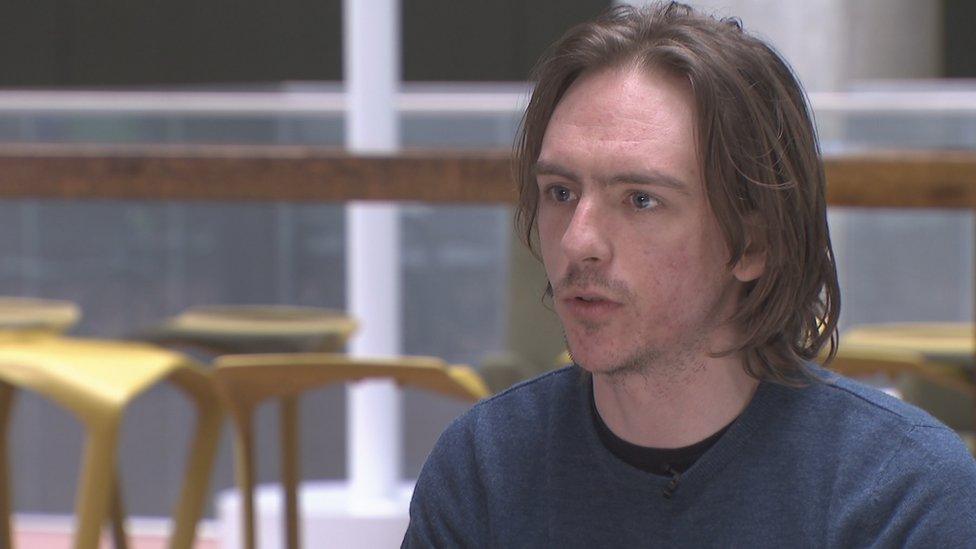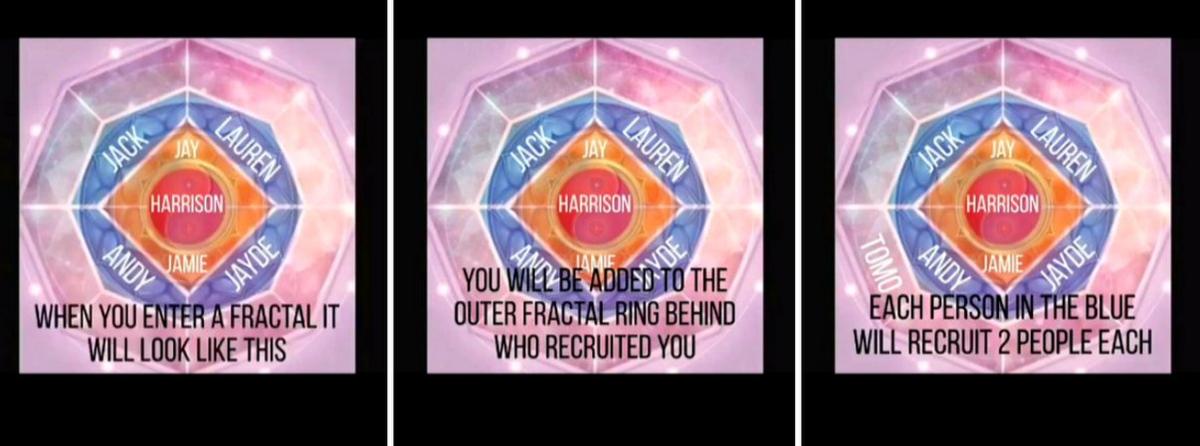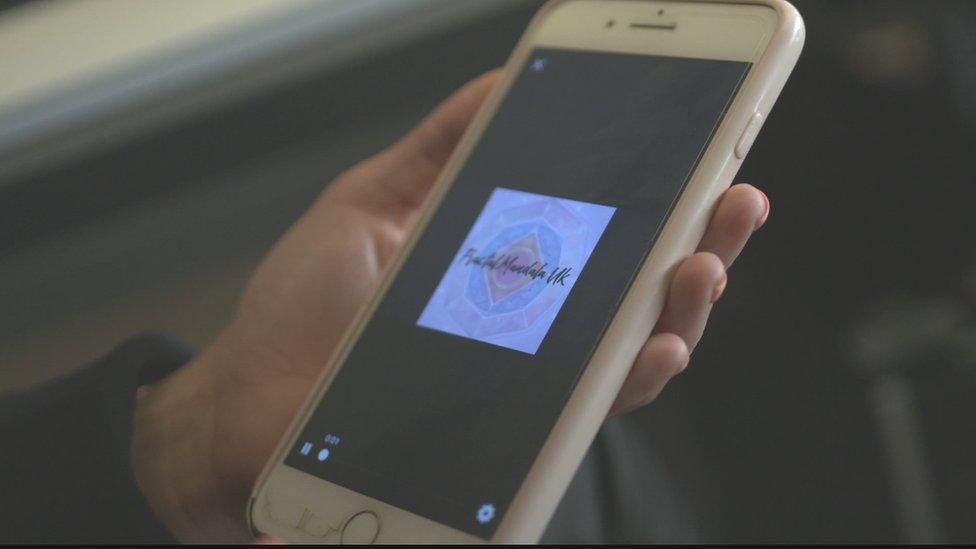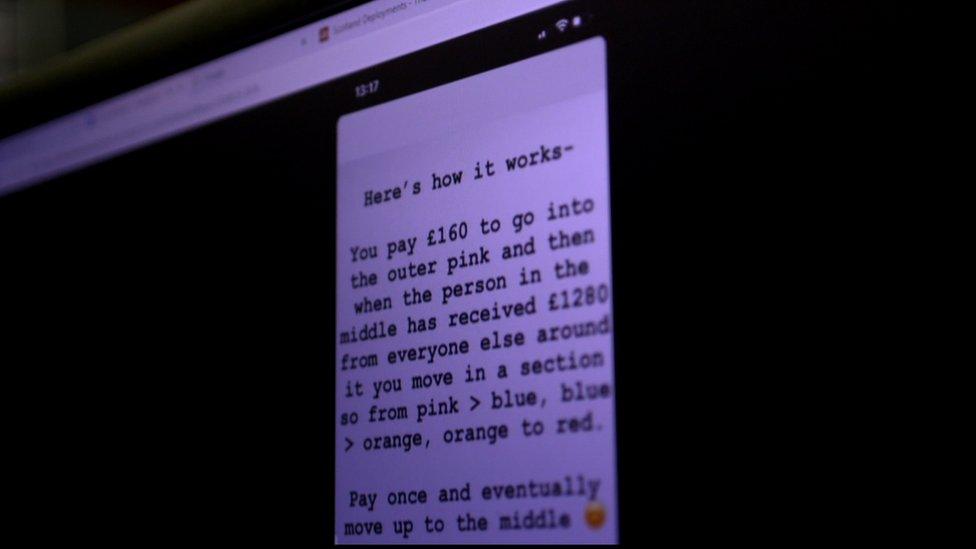Warning over pyramid scheme aimed at social media generation
- Published

A pyramid scheme fraud is targeting young people on social media
Social media users are being targeted by a scam which is leaving participants hundreds of pounds out of pocket.
The pyramid scheme has been appearing in newsfeeds and circulating online over the past week, targeting people who may never have heard of them.
It's the latest in a number of get-rich-quick schemes which target young people under 30.
A scheme called "loom circle" or "fractal mandala" has seen people promised £1280 from a £160 investment.
It is an old-fashioned scam which has been re-packaged for a new generation .
What is new is the target market.
The scheme asks participants to pay £160 up front with the promise of making a return of eight times that amount.


A pyramid scheme generally starts with one member recruiting two others, and so on.
What is a pyramid scheme?
Typically in a pyramid scheme, you pay to join.
The scheme relies on you then recruiting other people to join up and to part with their money as well.
For everyone in the scheme to make a profit, though, there needs to be an endless supply of new members.
In reality, the number of people willing to join the scheme, and ultimately the amount of money coming into the scheme, will dry up very quickly.
Pyramid schemes are not sustainable and are often illegal.


Expert Scott McGready says this type of fraud is nothing new but people should report it
Action Fraud, the National Cyber Crime and Reporting Centre, says they've noticed a rise in so-called investment schemes being advertised on these channels. And people in their twenties, who may think of themselves as the most social media savvy, are most likely to fall victim.
Cyber scam expert Scott McGready told BBC Scotland News: "Pyramid schemes are nothing new.
"They've been around since the early 1900s. It's just re-skinned and re-made for a new platform and a new audience.
"We don't know how common they are because people are not coming forward and saying it happened to them. People don't tend to report it because they fell a bit stupid, a bit silly. But that's not the case. This type of fraud is prevalent, especially on social media.
"In this one 64 people had to pay in to get the top payout - that's about £10,000 you need to send to a fraudster between 64 people. So it's pennies for a fraudster to send back £1,000 to one person, they've still made £9,000."

Video graphics demonstrated how the loom circle worked
"I feel so stupid"
"Sarah" handed over £160 after a friend convinced her she had received a payout. She didn't research the scheme before parting with her cash, but soon saw tweets about the scam.
She said; "I opened up my phone to messages from my friend just to say there is this thing going about called a "loom circle".
"She said she put money into it and it's come out. She put in £160 and she got out £1280. She said she had the money and it was legit, not a scam, people have made a lot of money from it.

The pyramid scheme has been circulating on social media
"I had seen a few people posting it on their Instagram stories and that's how it was doing the rounds.
"So I stupidly went into it and put the money into it and was added into a Whatsapp chat where the icon was a picture of the loom circle with people's names in it.
The chat had maybe 16 people in it. To be added onto the circle you transferred money to the person in the middle of the circle. Their bank details were on the top of the Whatsapp chat.
"The way it looked and the buzz about it - people thought it actually was working.

People believed the scheme was real after friends claimed they had received money
The circle I was in - once the person in the middle was paid it splits in half. I was moved and the circle stopped moving. Less people were added in and I kept seeing tweets it was a scam.
Sarah called her bank who investigated it as a fraud. Because her money was still in the account she sent it to, they refunded her.
Now she wants to warn others: "I had never heard of a pyramid scheme. I feel looking back it was really stupid to join it in the first place. Because people said they had got the money, I believed it.
"I just feel a bit misled and really silly. I sent money to someone I didn't know. It looked like something real.
"£160 is a lot of money if you are a young person so people need to be more aware."
- Published24 May 2011
